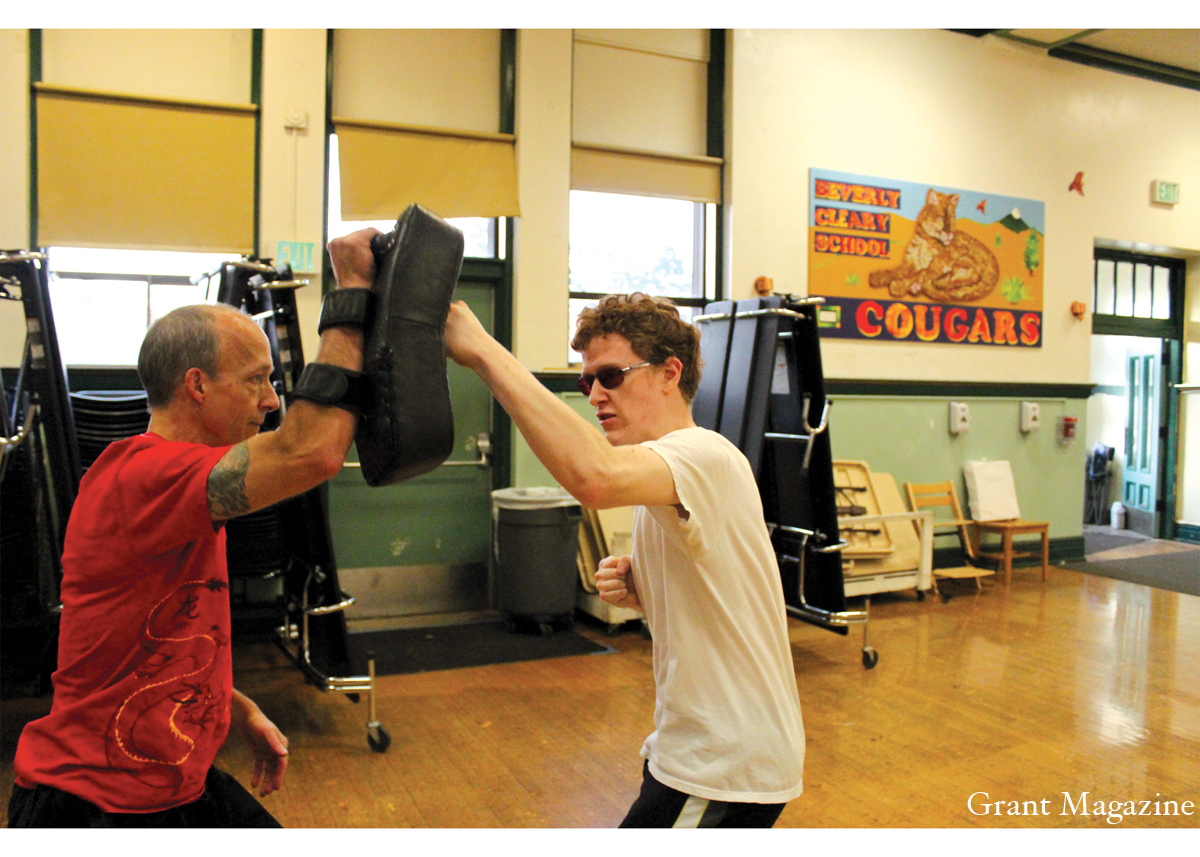The other day, I was taking the bus home and I saw a guy standing a few feet ahead of me. He was a Grant High School student, wearing a shirt that said: “Cool story babe, now go make me a sandwich.”
Normally, I would just roll my eyes at such a stupid and sexist sentiment. But the fact that I was willing to ignore that disrespect rather than confront it is what really shook me. It’s 2013. Are we really still laughing about this whole “women belong in the kitchen” attitude?
Some say, “Hey, lighten up. It’s just a joke.” But commentary like that chips away at the respect women have long fought for, so I’m going to take issue with it.
As a kid growing up, I remember playing tag, going on the tire swing, and running around with all the kids in my elementary school. Up until fourth grade, I was playing kickball and foursquare most days at recess. I loved sports and I even got pretty good at both games, which was an accomplishment because most of the other participants were boys.
But soon after a rift appeared between the boys and the girls. In upcoming school years, many girls around me spent lots of time and effort on fashion and beauty trends, which was fine. Those just didn’t interest me. Boys for the first time began judging girls on how they looked, even voicing it to them. It was no wonder girls wanted to look nice all the time.
In seventh grade, a boy at my math table called me plain-looking and boring. He was a brat, but it still stung. It’s shocking to look back and see 12-year-old boys and girls already falling into these roles.
I had spent much of my childhood idolizing women soccer players like Mia Hamm and Christine Sinclair. Hamm was one of the leaders of the 1999 national team that won the Women’s World Cup and started a soccer revolution that encouraged young girls across the country to play the game. (The only Barbie I ever owned was a Mia Hamm doll.)
My mother always encouraged me to be who I wanted to be. I was a tomboy back in the day, just like her, and she loved to see me running around, wrestling with my sister, getting scraped and bruised. But she also encouraged us to play dress up and look like princesses. It was nice knowing that I could do both, knowing there was nothing boys could do that girls couldn’t do, either. That idea was ingrained in us.
But middle school and high school did a number on my confidence. I changed my clothes, put on makeup and worried about my weight. I fell into the social trap of needing to look like everyone else. It’s because the media, boys and society all get too much of a say in how girls and women feel about themselves.
In high school, things get worse for girls. Today, I see friends get caught up in how much looks matter and what our body shapes are supposed to be. Every morning, the first thought of every young woman seems to be: “Do I look good enough?”
Standards for women are impossible to measure up to and they are artificial. And I’m a bit tired of it all. It doesn’t matter if we know that most images of models on TV or in magazines are PhotoShopped to death. It only matters that we see them and we begin to compare ourselves to those images that aren’t even real. Most of the time, we can’t help but let it all affect us.
Recently, I watched a film called “Miss Representation” that covered topics from the vast underrepresentation of women in politics to individual tales of young girls growing up in a society jampacked with pressures to appeal to men. I was reminded of how terribly and incorrectly women are portrayed in media, and I was shocked to discover how much I had let it affect me as a young person.
Women are expected to look a certain way all the time, and if they don’t fit that criteria, they are ripped apart for it. Men might feel pressure, but it is nothing compared to this. The same standard isn’t there for men. Women and girls are treated like nothing more than objects. And we accept it. It’s that acceptance and tolerance that scares me the most.
It all makes me think: Why didn’t I confront the kid on the bus about his shirt? I wanted to ask him what he meant by wearing it. I also wonder if anyone else saw him and had the same reaction as I did. If we’re going to fight the sexism that surrounds us, then everyone – you, me, our parents, our teachers, our administrators – needs to not ignore these things. We need to speak up about them.
It makes me mad and I believe other girls also feel this way. But I’m betting many never really get the chance to say something because they think they won’t be understood or taken seriously by others.
If we did have a conversation as a community and talked about the inequities, we’d see a decrease in teen depression, eating disorders, major anxiety issues and more. I wonder how many girls would realize their potential and worth, which don’t have to revolve around looks.
We have to believe we have what it takes, and we have to understand that being attractive is not the only thing that makes us who we are as young women. After a few years of practice, I’ve learned to ignore pressure from the media, to not care about if guys will think I’m pretty, to not compare myself to prettier or skinnier girls. I just shut it all out. It’s not easy. But it’s definitely possible if we embrace it. ♦
Click here for more Thoughts pieces.


































